Promethean
From Halopedia, the Halo wiki
- "Oh, but what I would not give to have even a single company of Prometheans here right now... oh, they would most certainly restore order with their trademark lethality..."
- — 343 Guilty Spark musing to himself as his Installation is about to be destroyed.[1]
The Prometheans were the highest and most respected group of Warrior-Servants in the Forerunner ecumene.[2] During and after the Human-Forerunner War, they were led by the Didact. During the Forerunner-Flood war, the Prometheans' main base of operations was the fortress world known as Requiem.[3] Elements of the Prometheans survived the Forerunner-Flood war and the activation of the Halo Array, eventually awakening within Requiem and rising to oppose the UNSC in 2557.[4]
Background
Organic Prometheans
Physically, Prometheans were the highest form a Warrior-Servant could mutate to, standing around two times the height of a Forerunner Manipular and weighing about four or five times a Manipular's mass.[5] They were heavily muscled, their hands capable of easily crushing a human.[6] Their mental capabilities were also very sophisticated; it was common for a Promethean to share information and sensory input with the warriors under their command.[7] Prometheans were also capable of controlling a million remote-controlled craft, such as weapon-ships, simultaneously.[8]
They also used powerful vehicles known as war sphinxes for large-scale operations.[9] In order to combat the parasitic Flood during the Forerunner-Flood war, the Prometheans' arsenal of weapons was specifically tailored to disintegrate biomass to prevent Flood infection.[10]
The Prometheans were responsible for creating "Warrior Keeps" known as Cryptums, where an exiled warrior could live in suspended animation for thousands of years.
Known Prometheans
Mechanical Prometheans
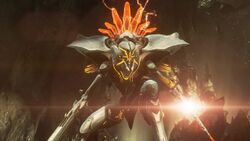
The Promethean forces encountered by UNSC forces and Covenant remnant insurgents on Requiem appear to be primarily mechanical in nature, and encompass various classes of leader units known as Knights, support drones known as Watchers, and small, pack-oriented Crawlers serving mostly as cannon fodder. Noted as being "significantly different" from the original Prometheans, the origin of these Promethean constructs is currently unknown.[4]
Visually, unlike most Forerunner technology which is chiefly angular and geometric, these Promethean units have a more curved, almost biomechanical aesthetic. Various Promethean units, including Knights and Watchers, have distinct heads embedded in their mechanical carapaces, complete with stylized facial features; this feature was shared by the war sphinxes used by the original Prometheans. It is later revealed that the mechanical Prometheans are in fact humans who were converted into digital intelligences by the Composer following their defeat in the Human Forerunner War.
Types
History
Following the Human-Forerunner War and the discovery of the Flood, the Prometheans, under the leadership of the Didact, stood in opposition to the radical faction of Builders led by Master Builder Faber, who proposed the construction of the Halo Array. They lost the political battle and were subsequently removed from the Ecumene Council, with the Master Builder's allies rising to power in the Council instead. Disgraced, the Didact and some of the other highest-ranking Prometheans were allowed the dignified choice of exile in a Cryptum, while some of the lesser-ranked commanders were accorded more severe punishments.[11]
After a thousand years of exile, the Didact was reawakened amidst the Forerunner-Flood war. Shortly after his revival, a radical shift occurred in the Council, and Faber lost his political power due to his crimes against the Mantle. Called upon to defend the ecumene against the onslaught of the Flood, the new Council elevated the Prometheans back to their former status, and the Didact resumed his duties as the supreme commander of Forerunner military forces.[12] Under the Didact's leadership, the Prometheans would lead the ecumene's defenses against the Flood until the end of the conflict and the activation of the Halo Array. During the war, the Prometheans were primarily based in the fortified shield world Requiem. Requiem was sealed off under as of yet unknown circumstances toward the end of the Flood conflict; containing the Didact's Cryptum, as well as legions of mechanized Promethean forces, the shield world remained closed off for the next one hundred millennia.[3]
Approximately five years after the end of the Human-Covenant War, John-117 and Cortana, drifting aboard the wreckage of the UNSC Forward Unto Dawn, came across the Forerunner world of Requiem, where they faced hostile mechanical Prometheans.[4] During the events that followed, the Didact was awakened from his Cryptum.[13]
Trivia
- The Prometheans are introduced as a new enemy class in Halo 4.
- The name "Promethean" was probably inspired by the Titan Prometheus in Greek mythology, who gave the gift of fire to mankind. However, there is no in-universe relation between the names, as the Forerunners predated the Greeks by well over 100,000 years.
- "Promethean" was one of the names Doctor Halsey considered for the SPARTAN-II Program.[14]
Gallery
John-117 facing a Promethean Cryptum.[15]
List of appearances
- Halo: Cryptum (First appearance)
- Halo: Combat Evolved Anniversary
- Terminals (Mentioned only)
- Halo: Primordium
- Halo 4
Sources
- ^ Halo: Combat Evolved Anniversary - Terminal 10
- ^ Halo: Cryptum, page 54
- ^ a b Halo Waypoint: Halo 4 Interactive Guide
- ^ a b c Halo 4 Official Site, Characters
- ^ Halo: Cryptum, page 65
- ^ Halo: Cryptum, page 77
- ^ Halo: Cryptum, page 162
- ^ Halo: Cryptum, page 174
- ^ Halo: Cryptum, page 95
- ^ GameInformer, October 2012 edition (digital content)
- ^ Halo: Cryptum, page 238-239
- ^ Halo: Primordium, page 336-339
- ^ GameTrailers: GTTV: Halo 4
- ^ Dr. Halsey's personal journal
- ^ Xbox.com: Xbox Press Center - Halo 4 - Artwork (Halo 4 Key Art - Cryptum_Vertical)
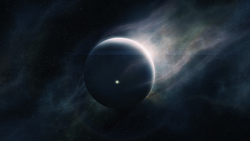
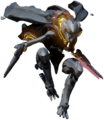
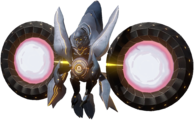
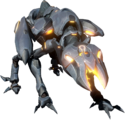
![John-117 facing a Promethean Cryptum.[15]](https://halo.wiki.gallery/images/thumb/4/41/H4-Cryptum.jpg/94px-H4-Cryptum.jpg)